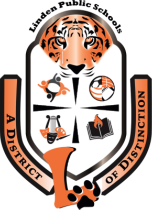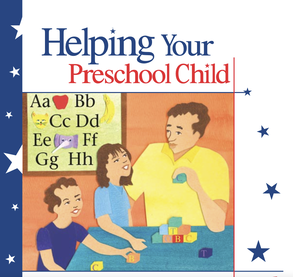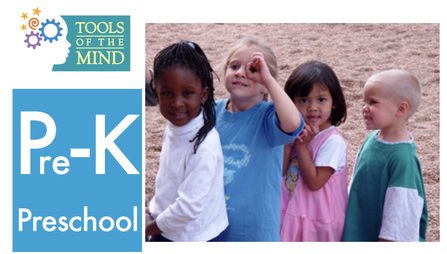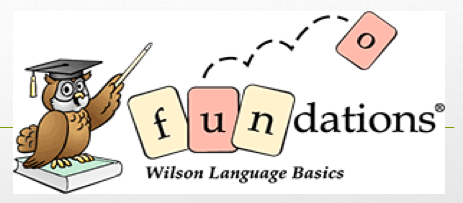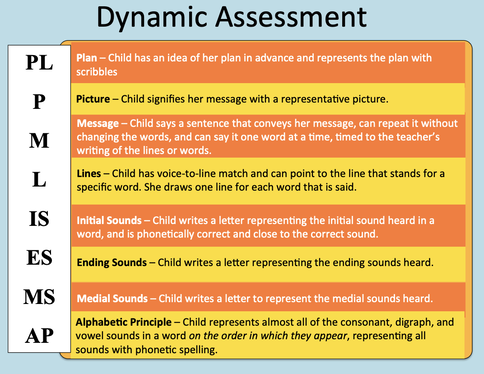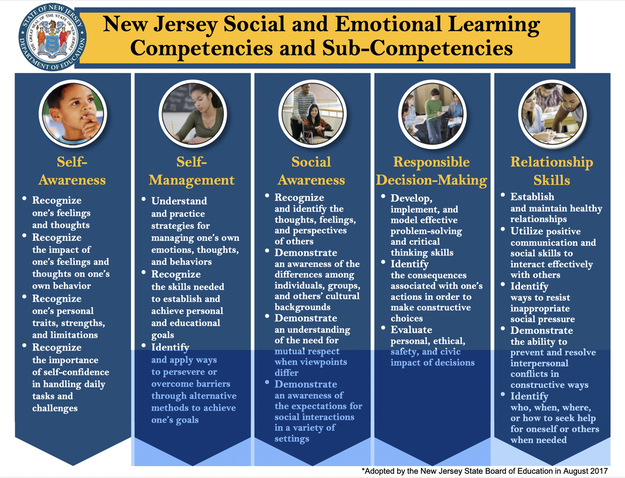Welcome to Pre-Kindergarten
Children in our Tools of the Mind Program are provided with a variety of developmentally appropriate activities. Literacy and language experiences are provided throughout each day and the classroom environment is rich with language and print. Listening, speaking, reading and writing activities are fostered as children engage in activities that encourage literacy exploration and emergent reading and writing skills.
Pre-Kindergarten students are introduced to and actively engage in key mathematical concepts, languages and processes the Tools of the Mind approach to math is designed to address NCTM Focal Points and the National Mathematic distillation of mathematical standards into the primary areas: the development of the number which includes: whole numbers, operations, relationships, and the development of Geometry, including special relationships and measurement. Math is integrated into all daily routines through individual and small group choices, planned experiences, problem solving, and reflection. The connections between math and literacy are explored daily in the Pre-Kindergarten classroom.
Through increased awareness of themselves, children are taught to relate within the social systems of the family, classroom community, neighborhood and the world. Developmentally appropriate activities are used to explore the differences among children, lifestyles and cultures. Community Building Activities encourage self-regulation, help children learn classmates’ names and help create a positive, connected classroom. Character Education aids children develop as moral, tolerant and caring people.
The goals of the Tools of the Mind Science block are for students to experience the scientific practices, increase a child’s scientific descriptive vocabulary and observational skills by attending to details. Pre-Kindergarten students use three Science kits throughout the year. These kits are filled with materials that are used in science centers, thematic units, and teachable moments. Included are: Lights and Shadows which stresses sources of light and the necessity of light to see objects; Exploring Seeds to Plants where students grow a variety of plants, making observations of the plant parts and the basic needs of plants; and Magnets where students experience the forces of attraction and repulsion.
Wilson Fundations curriculum provides research-based materials and strategies essential to a comprehensive reading, spelling, and handwriting program. Pre-K students are introduced to the Fundations activities for learning letter-keyword-sound, alphabetic order, and letter-formation skills. This program continues in kindergarten and lays the groundwork for mastering foundational skills.
A highly qualified staff working together with parents provides the children with a program that develops the academic, social and emotional skills to create the foundation necessary to become lifelong, competent learners. Linden’s expected learning outcomes for young children are based on the New Jersey Preschool Implementation Guidelines for 2014.
The Early Childhood Coaches focus on assisting teachers with the implementation of developmentally appropriate practices. They assist teachers in structuring the classroom environment, developing consistent routines and creating positive interactions with our youngest learners. Our coaches provide professional development opportunities for teachers throughout the school year and provide in-class coaching sessions to enhance instructional practices.
Our Family Involvement Specialist assists with the preparation and administration of all parent involvement activities, which include workshops on curriculum, social-emotional learning and transitions. Our Family Involvement Specialist works closely with our Early Childhood Social Worker to provide interventions and modifications to help students be successful in the classroom. They provide support for academics as well as student behaviors. Our Early Childhood Department has a variety of resources that are shared with families to help them support their child at home and school and connect them to community agencies.
Pre-Kindergarten students are introduced to and actively engage in key mathematical concepts, languages and processes the Tools of the Mind approach to math is designed to address NCTM Focal Points and the National Mathematic distillation of mathematical standards into the primary areas: the development of the number which includes: whole numbers, operations, relationships, and the development of Geometry, including special relationships and measurement. Math is integrated into all daily routines through individual and small group choices, planned experiences, problem solving, and reflection. The connections between math and literacy are explored daily in the Pre-Kindergarten classroom.
Through increased awareness of themselves, children are taught to relate within the social systems of the family, classroom community, neighborhood and the world. Developmentally appropriate activities are used to explore the differences among children, lifestyles and cultures. Community Building Activities encourage self-regulation, help children learn classmates’ names and help create a positive, connected classroom. Character Education aids children develop as moral, tolerant and caring people.
The goals of the Tools of the Mind Science block are for students to experience the scientific practices, increase a child’s scientific descriptive vocabulary and observational skills by attending to details. Pre-Kindergarten students use three Science kits throughout the year. These kits are filled with materials that are used in science centers, thematic units, and teachable moments. Included are: Lights and Shadows which stresses sources of light and the necessity of light to see objects; Exploring Seeds to Plants where students grow a variety of plants, making observations of the plant parts and the basic needs of plants; and Magnets where students experience the forces of attraction and repulsion.
Wilson Fundations curriculum provides research-based materials and strategies essential to a comprehensive reading, spelling, and handwriting program. Pre-K students are introduced to the Fundations activities for learning letter-keyword-sound, alphabetic order, and letter-formation skills. This program continues in kindergarten and lays the groundwork for mastering foundational skills.
A highly qualified staff working together with parents provides the children with a program that develops the academic, social and emotional skills to create the foundation necessary to become lifelong, competent learners. Linden’s expected learning outcomes for young children are based on the New Jersey Preschool Implementation Guidelines for 2014.
The Early Childhood Coaches focus on assisting teachers with the implementation of developmentally appropriate practices. They assist teachers in structuring the classroom environment, developing consistent routines and creating positive interactions with our youngest learners. Our coaches provide professional development opportunities for teachers throughout the school year and provide in-class coaching sessions to enhance instructional practices.
Our Family Involvement Specialist assists with the preparation and administration of all parent involvement activities, which include workshops on curriculum, social-emotional learning and transitions. Our Family Involvement Specialist works closely with our Early Childhood Social Worker to provide interventions and modifications to help students be successful in the classroom. They provide support for academics as well as student behaviors. Our Early Childhood Department has a variety of resources that are shared with families to help them support their child at home and school and connect them to community agencies.
A TOOLS CLASSROOM
· combines activities specifically designed to promote self-regulation with activities that focus on academic skills, while also giving children the opportunity to practice self- regulation/ executive function skills
· ensures children meet NJ state and national standards by emphasizing research-based activity content
· promotes mature play: make- believe in preschool and dramatization in kindergarten –which research shows is the most beneficial context for young children to develop self-regulation, cognitive, and social –emotional skills
· helps children become accustomed to every child having different supports, so no one feels out of place when a child gets something from the teacher that is different from what the rest of the children receive
· builds a child’s foundational skills in literacy and mathematics, which research has found to predict reading and mathematics achievement in later grades
· uses of developmental trajectories to ensure individualized instruction fits each child’s own developmental path
· provides instructional interactions to scaffold each child and helps ensure teachers are effective in identifying specific teachable moments.
· combines activities specifically designed to promote self-regulation with activities that focus on academic skills, while also giving children the opportunity to practice self- regulation/ executive function skills
· ensures children meet NJ state and national standards by emphasizing research-based activity content
· promotes mature play: make- believe in preschool and dramatization in kindergarten –which research shows is the most beneficial context for young children to develop self-regulation, cognitive, and social –emotional skills
· helps children become accustomed to every child having different supports, so no one feels out of place when a child gets something from the teacher that is different from what the rest of the children receive
· builds a child’s foundational skills in literacy and mathematics, which research has found to predict reading and mathematics achievement in later grades
· uses of developmental trajectories to ensure individualized instruction fits each child’s own developmental path
· provides instructional interactions to scaffold each child and helps ensure teachers are effective in identifying specific teachable moments.
| Tools of the Mind Parent Brochure | |
| File Size: | 5768 kb |
| File Type: | |
| Tools of the Mind Parent Brochure- Spanish | |
| File Size: | 399 kb |
| File Type: | |
The Fundations® Pre-K Activity Set offers an introduction, or “pre-dose,” to the letter-sound and writing skills that will be taught to mastery in the Fundations Level K program. It is a multisensory and systematic phonics, spelling, and handwriting program. The Fundations® Pre-K Activity Set supports students’ emerging understanding of the alphabetic principles of letter-sound associations and alphabetical order, and the written language skill of manuscript letter formation.
First SemesterThe focus during the first semester will be on teaching the alphabetic principle of letter-sound correspondence with the whole class. Students will practice:
First SemesterThe focus during the first semester will be on teaching the alphabetic principle of letter-sound correspondence with the whole class. Students will practice:
- Recognition of the alphabetical order of letters a-z
- Letter name, keyword, and sound for the 26 letters of the alphabet (letter-sound correspondence)
- Visual connection between the letter name, its sound, and its grapheme (or written representation)
- Letter formation for lowercase letters
- Letter formation for uppercase letters
- Association of a sound with a letter that is written
Reading
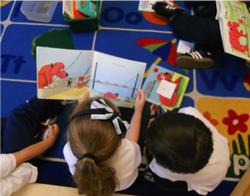
Buddy Reading
In Buddy Reading, children are paired with a partner to read. Self -regulation is built into this activity using “lips” and “ears” mediator cards. Children are reading at their own level.
In Buddy Reading, children are paired with a partner to read. Self -regulation is built into this activity using “lips” and “ears” mediator cards. Children are reading at their own level.
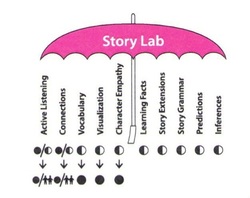
Story Lab
Story Lab provides practice in oral language, storybook reading and comprehension strategies through a series of activities with the same books. Many of the books are classic stories designed to provoke thinking and imagination. The series of Story Lab activities forms an interconnected progression that builds skills in listening comprehension, oral language, vocabulary and memory.
Story Lab provides practice in oral language, storybook reading and comprehension strategies through a series of activities with the same books. Many of the books are classic stories designed to provoke thinking and imagination. The series of Story Lab activities forms an interconnected progression that builds skills in listening comprehension, oral language, vocabulary and memory.
Make Believe Play Centers
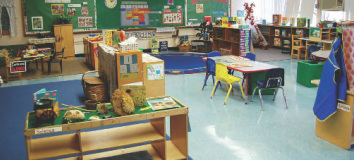
The Make -Believe Center Block is a 60 minute uninterrupted block when children engage in intentional make-believe play. During this time, children plan their play, and engage in play with each other. Tools make- believe play elements are layered on top of the traditional centers found in early education.
Play themes are introduced approximately every 4 to 6 weeks. Teachers convert all of the classroom centers to the new theme. Although each theme is different, the classroom structure remains around the major 6 centers: Literacy, Dramatic Play, Science, Blocks, Art, Table Toys.
Play themes are introduced approximately every 4 to 6 weeks. Teachers convert all of the classroom centers to the new theme. Although each theme is different, the classroom structure remains around the major 6 centers: Literacy, Dramatic Play, Science, Blocks, Art, Table Toys.
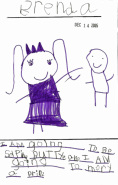
Play Planning
Children plan their play every day, right before they start playing in the centers. A Play Plan usually describes the role and the actions a child will engage in during play.
Children plan their play every day, right before they start playing in the centers. A Play Plan usually describes the role and the actions a child will engage in during play.
Writing
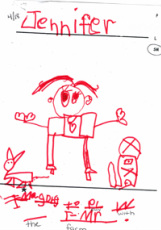
Scaffolded Writing
Children use Scaffolded Writing to plan, draw, and then write messages with the help of multiple mediators. In this form of writing, lines are used to represent words. What children's writing looks like (scribbles, drawing, lines, initial sounds, estimated/invented spelling, word patterns) depends on where each child is in his or her writing development.
Children use Scaffolded Writing to plan, draw, and then write messages with the help of multiple mediators. In this form of writing, lines are used to represent words. What children's writing looks like (scribbles, drawing, lines, initial sounds, estimated/invented spelling, word patterns) depends on where each child is in his or her writing development.
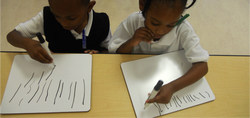
Graphics Practice
In this activity, children develop fine motor and self-regulation skills while they practice forming graphical marks and shapes they will need for writing. As the year progresses, Graphics Practice grows with the children. It also supports the development of children's fine motor capacities that eventually lead to letter formation.
In this activity, children develop fine motor and self-regulation skills while they practice forming graphical marks and shapes they will need for writing. As the year progresses, Graphics Practice grows with the children. It also supports the development of children's fine motor capacities that eventually lead to letter formation.
Mathematics
The Tools of the Mind approach to math is designed to address NCTM Focal Points and the National Mathematics distillation of mathematic standards into the primary areas: the development of the number which includes whole numbers, operations and relationships, and the development of Geometry, including spacial relationships and measurement.
Number-whole numbers,operations and relationships
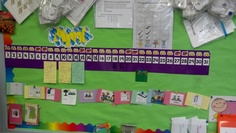
Timeline Calendar
In Timeline Calendar, the teacher leads the children in reading the calendar, which is a linear format instead of the traditional matrix. Each day the teacher marks an X over the day's date. The children use the number line to learn time and number concepts. They count the numbers of days, talk about upcoming events and past events, comment on the number of days until and since an event, etc.
In Timeline Calendar, the teacher leads the children in reading the calendar, which is a linear format instead of the traditional matrix. Each day the teacher marks an X over the day's date. The children use the number line to learn time and number concepts. They count the numbers of days, talk about upcoming events and past events, comment on the number of days until and since an event, etc.
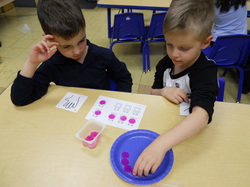
Making Collections
The purpose of this is activity is to engage children in meaningful counting, represent quantities with objects, and use 1:1 correspondence to confirm quantity. Children use language to identify if the collection is "correct", has "too many" or "too few". As the year progresses, Making Collections grows with the children
The purpose of this is activity is to engage children in meaningful counting, represent quantities with objects, and use 1:1 correspondence to confirm quantity. Children use language to identify if the collection is "correct", has "too many" or "too few". As the year progresses, Making Collections grows with the children
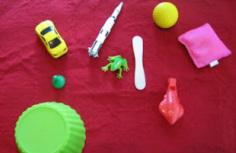
Math Memory
In Math Memory, children play close attention to objects and their attributes and use language to help them remember different objects that the teacher assembles and then hides. The teacher makes a hidden change to the set of objects by removing, adding, substituting, or keeping the same objects.
In Math Memory, children play close attention to objects and their attributes and use language to help them remember different objects that the teacher assembles and then hides. The teacher makes a hidden change to the set of objects by removing, adding, substituting, or keeping the same objects.
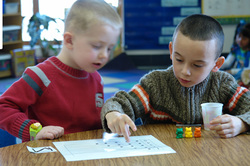
Numerals Game
In Numerals Game, children work in pairs, with one child counting out a number of objects and the other child checking the accuracy. The checker uses 1:1 correspondence to determine whether the quantity of the collection is correct and says whether there are "too many", "too few"; the other child corrects the mistake if needed. Then the children trade roles.
In Numerals Game, children work in pairs, with one child counting out a number of objects and the other child checking the accuracy. The checker uses 1:1 correspondence to determine whether the quantity of the collection is correct and says whether there are "too many", "too few"; the other child corrects the mistake if needed. Then the children trade roles.
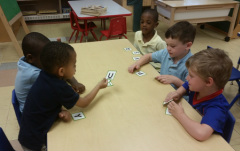
I Have Who Has Games
The I Have Who Has Games are a series of games that are used to teach fluency for learning many concepts in the Tools program. Children manage multiple cards and increase speed of the game in a fun, small group activity that supports concepts, memory and language development.
The I Have Who Has Games are a series of games that are used to teach fluency for learning many concepts in the Tools program. Children manage multiple cards and increase speed of the game in a fun, small group activity that supports concepts, memory and language development.
Geometry - Spacial relationships & Measurement
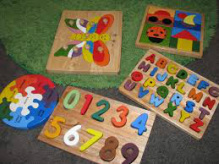
Puzzles & Manipulatives
The purpose of these activities is to use mental visualization instead of physical trial and error to solve puzzles, observe and discuss parts-whole relationships, use positional words and geometry concepts, and use manipulatives to make patterns.
The purpose of these activities is to use mental visualization instead of physical trial and error to solve puzzles, observe and discuss parts-whole relationships, use positional words and geometry concepts, and use manipulatives to make patterns.
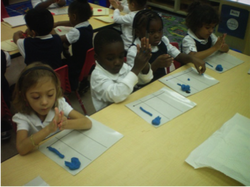
Remember & Replicate
In this activity, children remember and replicate sets of different colored, sized and shaped forms that they first watch the teacher make or assemble. Remember & Replicate develops the child's memory and knowledge of positional words, spatial awareness, shape, and color concepts.
In this activity, children remember and replicate sets of different colored, sized and shaped forms that they first watch the teacher make or assemble. Remember & Replicate develops the child's memory and knowledge of positional words, spatial awareness, shape, and color concepts.

Mystery Questions & Games
This is a morning activity designed for children to learn to focus attention and purposely remember, follow directions, practice different concepts, use expressive language, become familiar with the conventions of print and recognize that print conveys meaning.
This is a morning activity designed for children to learn to focus attention and purposely remember, follow directions, practice different concepts, use expressive language, become familiar with the conventions of print and recognize that print conveys meaning.
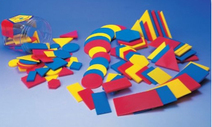
Attribute Game
In Attribute Game, children work in small groups and then in pairs to sort objects by different attributes: size, shape, color and number of side.s
In Attribute Game, children work in small groups and then in pairs to sort objects by different attributes: size, shape, color and number of side.s
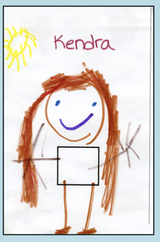
Venger Drawing & Venger Collage
This activity is a creative exercise designed to promote a diversity of ideas. Children discuss ideas about what object, part of an object a geometric shape could compose, and then the children represent their own ideas in a drawing.
This activity is a creative exercise designed to promote a diversity of ideas. Children discuss ideas about what object, part of an object a geometric shape could compose, and then the children represent their own ideas in a drawing.
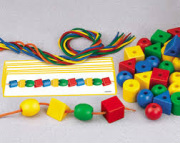
Patterns with Manipulatives
In Patterns with Manipulatives, children arrange small table toys to construct patterns that match pattern strips provided by the teacher. Children work in pairs, one child replicating a pattern, the other child checking. They switch roles and work with new pattern strips.
In Patterns with Manipulatives, children arrange small table toys to construct patterns that match pattern strips provided by the teacher. Children work in pairs, one child replicating a pattern, the other child checking. They switch roles and work with new pattern strips.
Science
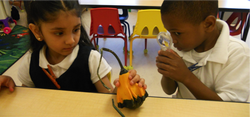
Science Eyes
In Science Eyes, children closely observe objects using a Magnifying Glass Mediator, and use new vocabulary to describe their observations. At the end of the activity, children make a drawing representing details of their observations.
In Science Eyes, children closely observe objects using a Magnifying Glass Mediator, and use new vocabulary to describe their observations. At the end of the activity, children make a drawing representing details of their observations.
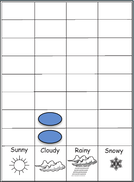
Weather Graphing
In Weather Graphing, children identify the kind of weather outside, and the teacher places a sticker on the Weather Graph. Each day children compare whether there are more of a certain kind of "weather days" than others.
In Weather Graphing, children identify the kind of weather outside, and the teacher places a sticker on the Weather Graph. Each day children compare whether there are more of a certain kind of "weather days" than others.

Science Kits
The Foss and Insight Science Kits enhance the curriculum and focus on the study of: Magnets, Light and Shadows and Seeds to Plants.
The Foss and Insight Science Kits enhance the curriculum and focus on the study of: Magnets, Light and Shadows and Seeds to Plants.
Social Studies
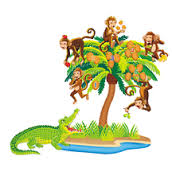
Self- Regulation & Attention Focusing Activities
Fingerplays are used in Tools of the Mind as the primary way to get children's attention and participation prior to a starting an activity and during transitions between activities. In addition to teaching self-regulation, finger plays have the added advantage of teaching rhyme and are a part of the culture of childhood. New research shows that fingerplays and songs influencene motor and self-regulatory skills.
Fingerplays are used in Tools of the Mind as the primary way to get children's attention and participation prior to a starting an activity and during transitions between activities. In addition to teaching self-regulation, finger plays have the added advantage of teaching rhyme and are a part of the culture of childhood. New research shows that fingerplays and songs influencene motor and self-regulatory skills.
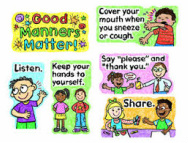
Character Education
Throughout the curriculum children experience Character Education, which helps them develop as moral, tolerant, caring people.
Throughout the curriculum children experience Character Education, which helps them develop as moral, tolerant, caring people.
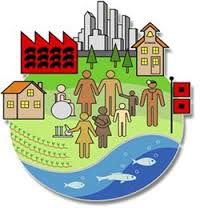
Community
Community Building Activities encourage self-regulation, help children learn their classmate's names and help to create a positive, connected classroom. Community Building is critical for high-level make believe play. In addition through the various themes, children experience the roles of members of family and community and explore community life.
Community Building Activities encourage self-regulation, help children learn their classmate's names and help to create a positive, connected classroom. Community Building is critical for high-level make believe play. In addition through the various themes, children experience the roles of members of family and community and explore community life.
